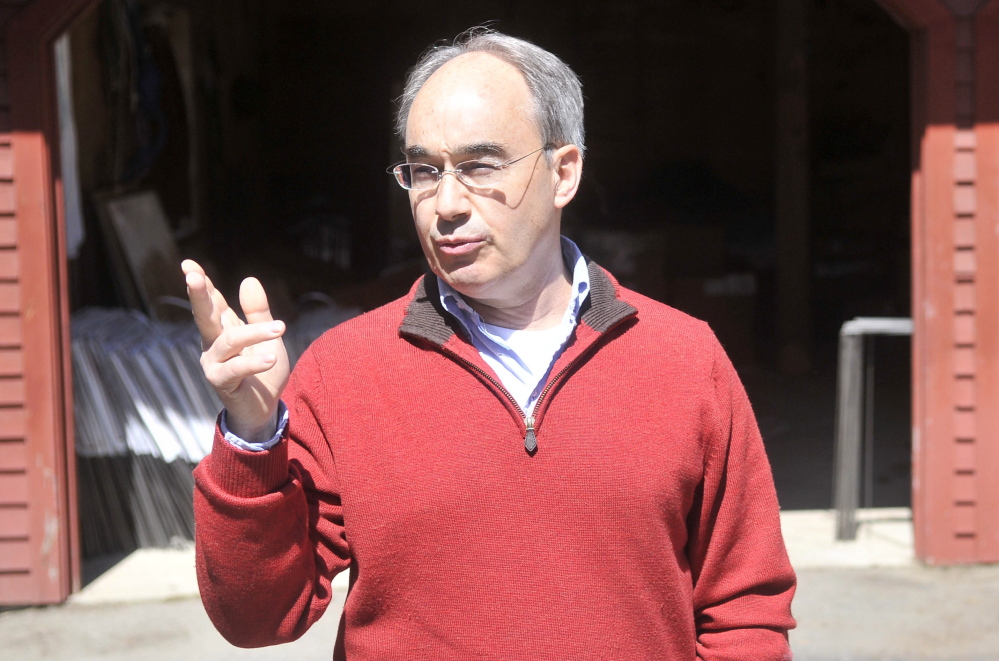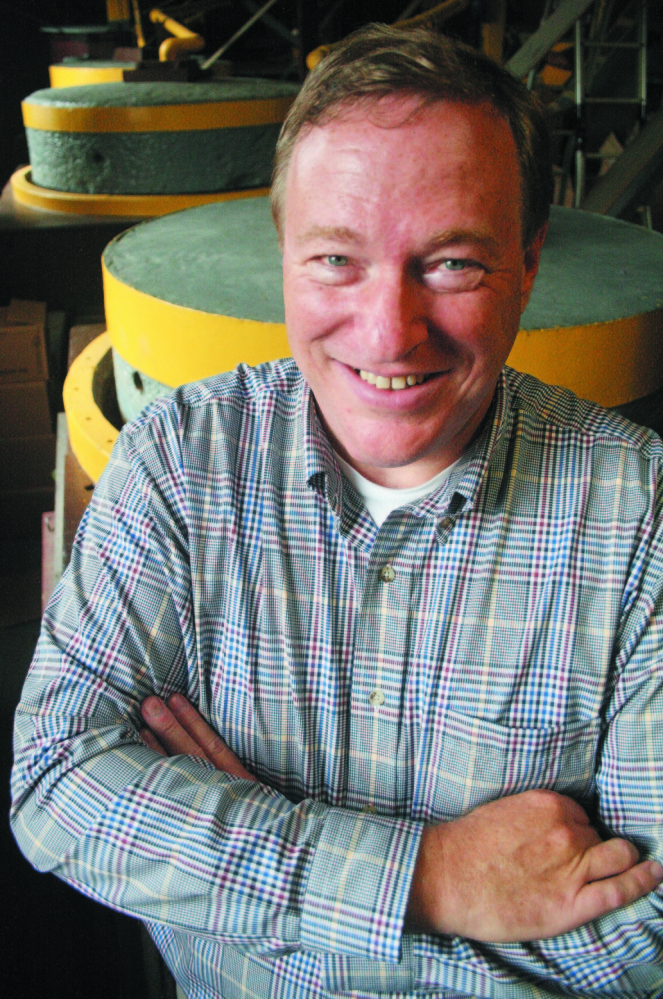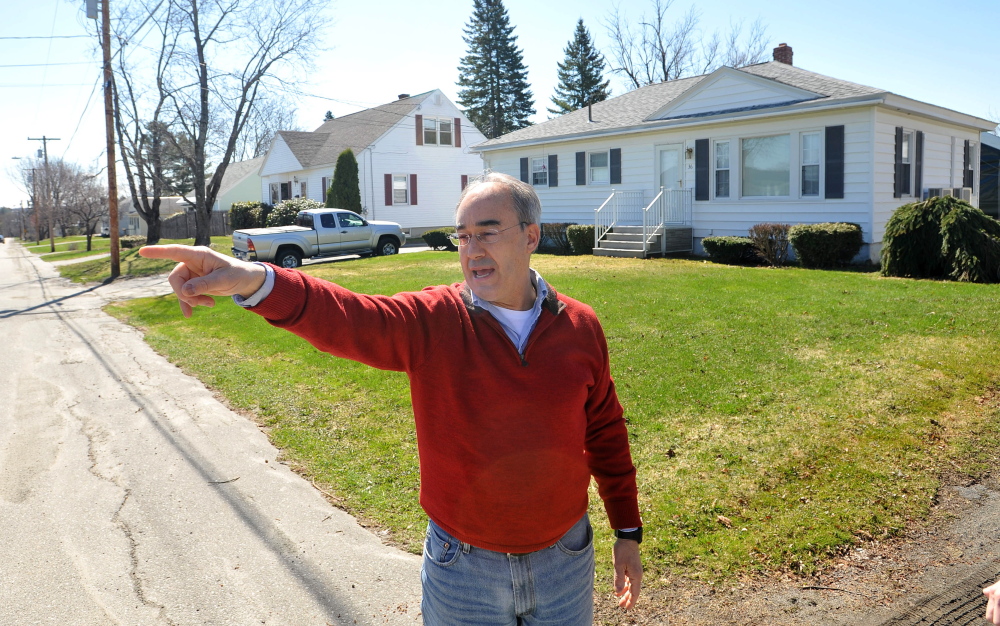OAKLAND — Bruce Poliquin stood Friday on the shore of Messalonskee Lake near the bunkhouse he and his brother shared on many summer nights at camp, where he swam and skated as a child.
“My roots are in central Maine; it’s where I’m from,” said Poliquin, a Republican running for his party’s nomination to Maine’s 2nd Congressional District seat. “It’s where I grew up.”
But this year the campaign signs for his primary opponent, Kevin Raye, have a motto: “From here, for us.” It’s a not-so-subtle jab at Poliquin, who lived at his large estate in coastal Georgetown – which is in the state’s other congressional district – before moving to a family home in Oakland as he announced his run last year.
The residency conversation is taking over the primary race. Not for 20 years has a politician’s home and history been such an issue in a Maine campaign.
Raye, 53, of Perry, has lived in the district almost his whole life. He grew up in Eastport; went to college in Lewiston; represented Washington County in the Maine Senate and, along with his wife, Karen, runs Raye’s Mustard, the Eastport mustard mill that’s been in his family for more than a century.
Poliquin, 60, grew up in Waterville, just east of Oakland. He was educated and made his name out of state, going to boarding school and Harvard University en route to a successful investing career in New York City.
On Friday, Poliquin toured his stomping grounds in Waterville, pointing out his modest childhood ranch home on Violette Avenue and rattling off names of his old neighbors. He continued to Oakland, driving along the route he used as a child to ride his bike to his family’s lakeside camp on the property his home sits on now.
But this isn’t Poliquin’s whole story. A Kennebec Journal review of land records shows Poliquin, a former state treasurer, owns three homes in Maine, and controls millions of dollars in real estate. He said he moved to Oakland in August, the same month he declared himself a candidate in the race. He registered to vote there in October.
Meanwhile, records show that Raye, an ex-Maine Senate president, didn’t own a home in Maine when he filed to run for the 2nd District seat in 2001, a race he lost to U.S. Rep. Mike Michaud, a Democrat now running for governor.
Mark Brewer, a political science professor at the University of Maine in Orono, said the Oakland move “could be a problem for Poliquin because there are people who already think he’s opportunistic” after runs for office in 2010 and 2012 that ended in primary losses.
But Brewer said that if he were advising Raye, he would tell him that his move in 2001 “could turn the tables a bit” on his argument against Poliquin.
“If you look at it on its face,” Brewer said, Raye “did kind of the same thing.”
REAL ESTATE BUSINESS
Poliquin’s family is from Waterville, but has roots in Lewiston and Frenchville, he said. Poliquin moved back to Maine in 1989 after an investment career in New York, living initially in Cumberland.
He’s in the real estate business now, and controls at least $8.4 million in Maine property personally and through holding companies. He bought his coastal home on 12 acres in Georgetown, assessed last year at $3.4 million, in 2001, and it has been called one of the most valuable residential properties in Maine. He was criticized as state treasurer for putting 10 acres of his parcel in a state tax-break program. He has since removed the property from the program.
Poliquin bought a lot of property in Maine in the years before then, including a home on Wood Island off Phippsburg.
Poliquin has had property in Oakland for years, including Blake Island in the middle of Messalonskee Lake since 1988. The 7-acre island was named one of Portland Monthly magazine’s Maine “dream islands” in 2009.
There are no buildings there and it’s for sale.
The Snow Pond Road property has been in his family for five decades as a camp, which still stands. His parents later built the house he lives in. He’s been on the deed since 2007, along with his parents, who moved recently to a retirement home in Brunswick. In October, they transferred it to him and he registered to vote there.
Inside, the home is sparsely decorated. Matthew and Megan Hutson, on Poliquin’s campaign staff, have moved in with the candidate, along with their dog.
Walking up from the lake, Poliquin notes that he didn’t have to move to run – the Maine Constitution doesn’t require that a congressional candidate live in his district, just that he lives in the state – but he did so “because it was the right thing to do” and it was easier to cover the district from there.
But Raye sees it as a political issue, and has asked rhetorically why Poliquin ran for the 2nd District instead of the 1st District, which is where his Georgetown home is located.
A main difference is that Michaud’s seat is open and the 1st District is represented by well-entrenched Democrat Chellie Pingree, whose husband, S. Donald Sussman, is majority share owner of MaineToday Media, which owns the Kennebec Journal, Morning Sentinel and Portland Press Herald.
“Obviously, there’s no legal requirement to live in the district you wish to represent, but for the people who live there, it’s a very significant issue,” Raye said in a Friday interview.
But Poliquin said he wants to focus on other issues.
“He can say what he wants,” Poliquin said of Raye. “We’re going to win the race and start changing Washington because it’s a heck of a mess down there.”
RAYE’S HOMECOMING
Poliquin has taken a different path than the last four people to represent the district over the past 31 years.
Michaud worked in a mill. His predecessor, Democrat John Baldacci, was born into a political family but managed his family’s Italian restaurant in Bangor. Republican Olympia Snowe got into politics just after graduating from the University of Maine. Republican William Cohen returned home to Bangor to practice law just after finishing school.
Raye’s history reads like a case study for capturing the seat. After growing up in Eastport and going to Bates College, Raye worked in Maine for Snowe from 1984 to 1994.
But he hasn’t always been in the district. He moved to Washington from 1995 to 2001 to be Snowe’s chief of staff after she moved to the U.S. Senate.
Raye had a home in Brewer from 1986 to 1999, but bought a home in Falls Church, Virginia, in 1997 after the move to Washington. In 2000, he bought the property where his current home sits, but listed his Virginia home on the deed as his address.
He resigned from Snowe’s staff in May 2001, telling the Bangor Daily News days afterward that he and Karen were living with her parents in Brewer as their Down East home, now valued at just over $300,000, was built. He filed for the race that June using their Brewer address, and sold his Virginia home late that July.
Raye registered as a voter in Perry on Election Day 2001. Raye said he has never registered to vote outside of Maine.
He went on to narrowly lose the race to Michaud, but staged a political comeback, going to the Maine Senate in 2004 and taking over the mustard business in 2005. He helped lead legislative Republicans to the majority in 2010 and became Senate president, but lost again to Michaud in a 2012 run for the 2nd District seat.
Poliquin wouldn’t offer an opinion about Raye’s move. But Raye said it wasn’t similar to Poliquin’s situation.
“Here’s what would have been the equivalent: Me running in the 1st District,” Raye said. “I was coming home.”
FACING SCRUTINY
Neither candidate has spent their whole lives in the 2nd District, but they’re still wrangling over hometown credibility.
“I am from the 2nd District: born, raised, educated right here,” Raye said in his convention speech last month. “My roots are here, my family is here, our small business and the jobs it provides are here and it is here that I worship every Sunday in the same church I grew up in.”
Poliquin drew some criticism for his first television ad, released last month. It didn’t mention the community he was born in, saying only “here, in Maine” as a sign that says “Entering Oakland” flashes on-screen.
The last high-profile Maine candidate to face similar scrutiny over residency was Republican Susan Collins during her 1994 run for governor, in which she finished third behind former Gov. Joseph Brennan, a Democrat, and independent Angus King, the winner. Collins and King now serve in the U.S. Senate.
Collins had worked in Massachusetts for two years preceding the run, and the Maine Constitution says a governor must have lived in the state for five years. A conservative activist challenged her in court. While she eventually won out, it was “a distraction” that dragged on her campaign, said Kenneth Palmer, a retired University of Maine political science professor.
Brewer, of UMaine, said Poliquin’s situation isn’t quite as glaring as other examples of politicians moving for expediency, such as Democrat Hillary Clinton’s 1999 move to New York to run for an open U.S. Senate seat there.
But “it’s clear he moved to the district to run for office,” Brewer said, so it could affect him in the June 10 primaries. Democratic state Sens. Emily Cain of Orono and Troy Jackson of Allagash also are running for their party’s nomination.
Raye said he hears of Poliquin’s residency from people “everywhere I go” on the campaign trail. However, the argument against Poliquin didn’t play well for at least two Republicans, one of them Raye’s third cousin.
John Picchiotti, the Fairfield town chairman and a former legislator, has endorsed Raye, but Poliquin’s residency doesn’t bother him because of Poliquin’s ties to and support in the area.
“I’m fine with either one of them,” Picchiotti said.
Tim Russell, the Sidney town chairman, said it was a good show of character for Poliquin to move to the district, since he didn’t have to. At the convention, he found Raye’s attack on Poliquin’s residency “kind of petty.”
“It sounds to me like Kevin Raye is grasping at straws and not talking the issues,” he said.
Michael Shepherd can be contacted at 370-7652 or at:
mshepherd@centralmaine.com
Twitter: @mikeshepherdme
Send questions/comments to the editors.





Comments are no longer available on this story